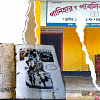Public library culture fading
The undivided Bengal had a rich history of library culture which emerged as a movement in the 19th century. Many more libraries were set up with the change of historical course from being a colony to an independent country to quench public thirst for knowledge for all the latest developments in the world of science, literature, politics, history and technology.
But the once rich library culture seems to have lost its glory with only around 1,300 libraries across the country cataloguing a dismal number of books. Worryingly enough, the number of library visitors and reading habit appear to be decreasing further, experts say.
No government data were available that could authenticate the actual number of libraries in the country. However, according to a recent study of the British Council, there are 68 government public libraries, 1,603 non-government public libraries and 3,596 NGO-operated libraries in Bangladesh.
In addition, there are e-centres like ICT-based public access venues such as cybercafés, telecentres and 4,547 government-installed rural Union Information and Service Centres (UISCs), says the study titled "Library Landscape Assessment of Bangladesh" released last month.
The last directory of the National Book Centre that came out in 2014 mentioned 1,065 as the number of libraries in the country. In the 2011 directory, the number was 1,042, while it was 1,797 in the 2003 directory.
Experts say the library movement in Bangladesh started with the establishment of four public libraries -- Woodburn Public Library in Bogra, Jessore Public Library, Barisal Public Library and Rangpur Public Library in 1854.
However, the number of public libraries and non-government public libraries is not encouraging compared to the population of the country, they observe.
"There was a time when library culture was a movement in the country. Well-off people in their locality used to set up libraries to quench people's thirst for knowledge. But gone are those days," said Prof Dr SM Mannan of information science and library management at Dhaka University.
The number of readers decreased, but what is alarming is the sharp decline in the reading habit, he added.
People have now many choices thanks to tremendous growth in information technology, he observed.
Ajoy Kumar Singha, a librarian of Hatibandha Public Library, said 10 years ago more than 50 people used to come to the library, which was established in 1961. Now the number of visitors has come down to four to five a day.
"Even there are days when nobody turns up," he said.
The library has 2,000 books.
On people shying away from reading books, Ajoy, who has been in this library for more than a decade, said, "The reason is obvious. People find less time to show up in the library because of the availability of cellphone and internet."
He further said the students who used to come in numbers get no time because of the pressure of studies, private tuition and coaching.
The British Council study says around 52 percent of all librarians think they are lacking printed materials.
A total of 451 venues, 34 government public libraries, 20 privately-owned public libraries, 81 NGO-run libraries, one community library and 315 e-centres were surveyed randomly for this study.
It says 43 of all librarians believe insufficient ICT facilities would be a "major challenge".
The study also finds that students constitute the majority of the users with 72 percent.
Bishwo Shahitto Kendro is an organisation that attempts to keep alive the rich Bengali literary tradition through books. Its mobile library programme issues more than 60,000 books across the country on an average every week through its 46 mobile units that have a total collection of about 300,000 books.
Prof Muhammad Mezbah-ul-Islam of information science and library management, DU, said library is considered as the "lighthouse" as it plays a crucial role in building knowledge-based society and therefore the movement should start from school.

 For all latest news, follow The Daily Star's Google News channel.
For all latest news, follow The Daily Star's Google News channel. 







Comments